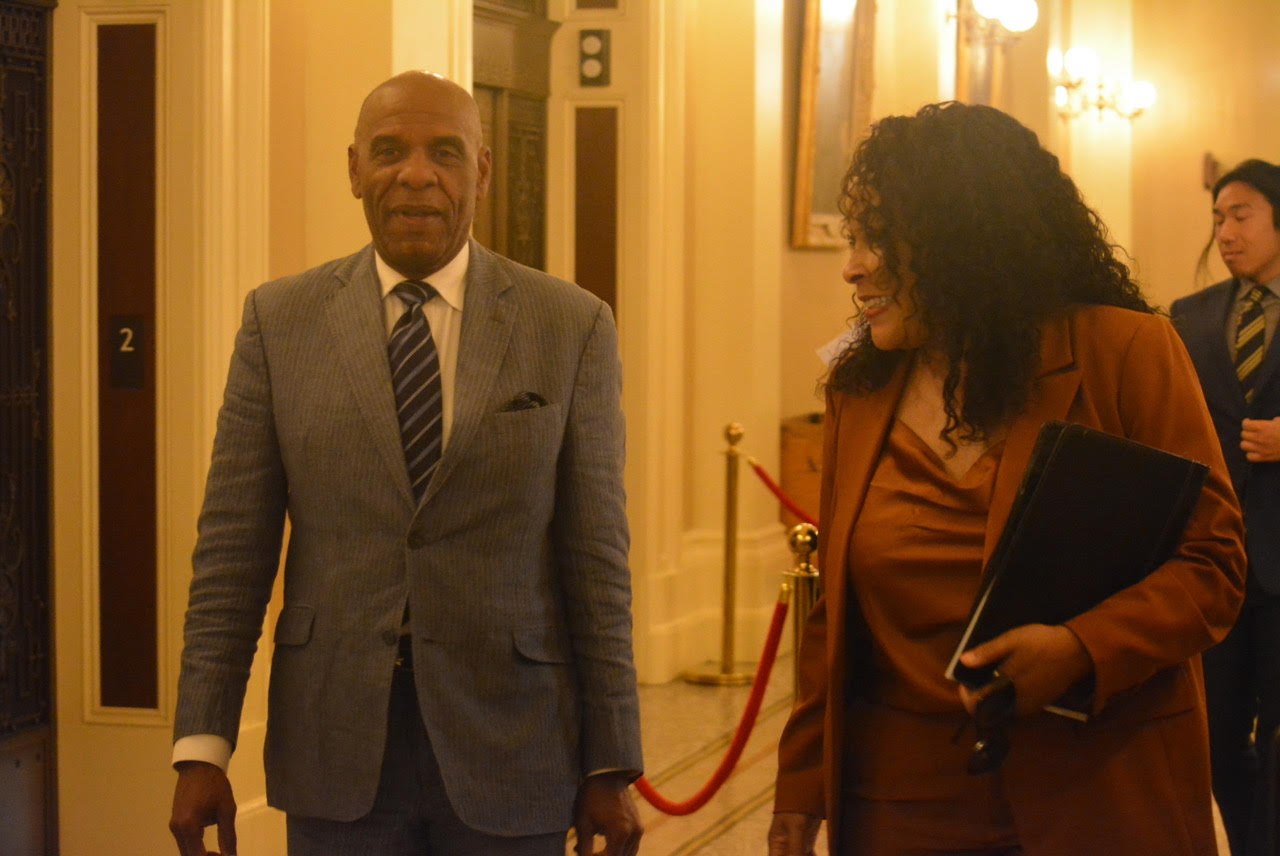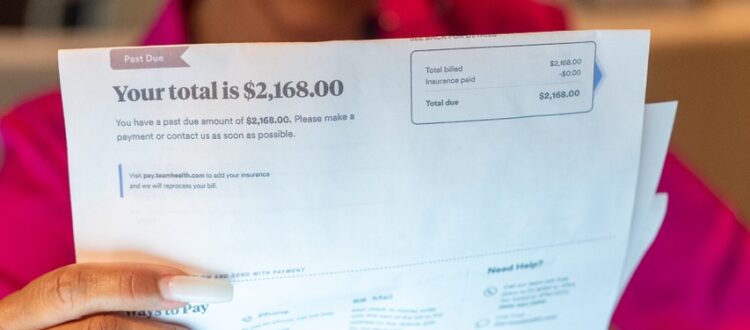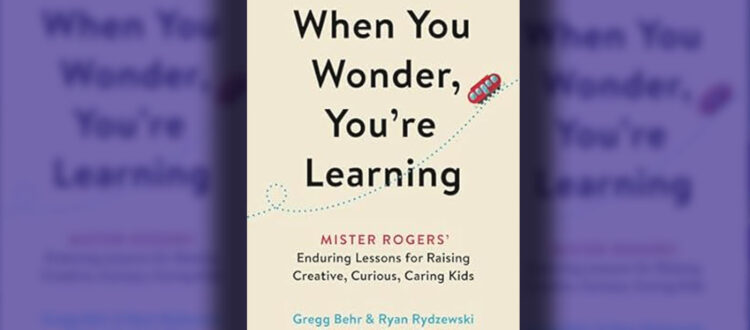California State Sen. Steven Bradford (D-Inglewood), left, and his Chief of Staff Carolyn McIntyre, right, leave the Senate chambers on May 21 at the State Capitol after three of Bradford’s reparations bills passed off the floor, including SB 1403 (California American Freedmen Affairs Agency). CBM photo by Antonio Ray Harvey.
Bo Tefu, Lila Brown and Antonio Ray Harvey | California Black Media
Calif. Senate Passes Landmark Package of Three Reparations Bills
Last week, the California State Senate voted to advance three landmark reparations bills authored by Sen. Steven Bradford (D-Inglewood). The bills aim to redress the economic and social injustices stemming from chattel slavery in the American South and more than a century of state-sectioned discriminatory practices that followed the Civil War.
The package of legislation now moves to the State Assembly for consideration.
The historic vote on Senate Bill (SB) 1403, SB 1050, and SB 1331 was held on the Senate floor late in the afternoon on May 21, while supporters representing several reparations advocacy groups observed from the gallery.
“lI appreciate my Legislative colleagues who have directly faced this important issue and shown great courage by passing these historic pieces of legislation,” said Bradford. “I look forward to working with the members of the Assembly to similarly pass these bills so we can present them to Governor Newsom for his signature.”
SB 1403 establishes the framework for the establishment of the California American Freedmen Affairs Agency (CAFAA), a state-level department that would administer all reparations activities. It passed with a 30-7 vote.
SB 1050 would offer compensation to Black Californians who lost homes or had their land taken without fair compensation as a result of the racially motivated misuse of eminent domain. It passed with a 32-4 vote.
With a vote of 30-7 on the Senate floor, SB 1331 also passed. It proposes the establishment of an account in the state treasury for the purpose of funding reparations policies approved by the Legislature and the Governor.
Darlene Crumedy, a Bay Area resident and member of the Coalition for a Just and Equitable California (CJEC), is one of the reparations supporters who has shown up at every Senate hearing for Bradford’s compensation bills.
She called passage of the bills “historic and special.”
“Now the work begins in the Assembly, and they are going to pass there, too,” Crumedy said expressing optimism about the bills’ future.
Calif. Assembly Bill That Would Allow Warrantless Arrests Advances to Senate
The California Assembly approved Assembly Bill (AB) 1990, the “Secured Transactions and Organized Theft Prevention (STOP) Act,” with a vote of 44-1 on May 23.
The bill is now headed to the State Senate for consideration.
Authored by Assemblymember Wendy Carrillo (D-Boyle Heights), the bill would allow a peace officer to make an arrest without a warrant for a misdemeanor shoplifting offense.
Carrillo said in a March 20 written statement that AB 1990 is “an urgent call to action in response to the alarming escalation of organized retail theft” incidents across the state.
“It is our responsibility to confront a problem that has been increasingly worsening over time,” Carrillo stated.
Assemblymembers Mike Gipson (D-Carson), and Carlos Villapudua (D-Stockton) are co-authors of the bill. Gipson and Assemblymember Kevin McCarty (D-Sacramento), who are members of the California Legislature Black Caucus (CLBC), voted in support of the bill.
Assemblymember Tina McKinnor, also a member of CLBC, opposes the legislation. She stated that it would be a “stop and frisk” law that would impact all races but disproportionately impact Black and Brown communities.
“We must keep a close watch on this bill,” McKinnor posted on the X social media platform on May 23.
Calif. Union Leader April Verrett Elected First Black President of SEIU
The Service Employees International Union (SEIU), one of the nation’s largest labor unions, elected its first Black president, April Verrett.
The union represents nearly two million members in the public sector, healthcare, and property services.
“By joining together, organizing, and — in many cases — striking, working people are taking power back from corporate interests and using that power to lift up their families and communities.”
Verrett is recognized for spearheading the union’s strategic planning process as the SEIU’s Secretary-Treasurer and she served as president of the SEIU California local chapter in 2015.
Verrett was sworn into her new role on May 20, at a ceremony held during the SEIU convention in Philadelphia. Vice President Kamala Harris gave the keynote address.
Harris and Verrett have known each other for years and worked together during their time as public servants in California.
“April is a leader who is always guided by an uncompromising focus on worker empowerment and their rights,” Harris said.
“What some people need to understand is that care work is physical work,” Harris continues. “It is emotional work. It is a job, and it is a calling, and care workers deserve to be paid fairly and fully for that work.”
The healthcare industry is one of several industries that has been impacted by national strikes following the COVID-19 pandemic.
“Make no mistake: working people are under attack and the stakes have never been higher; but the real challenge and opportunity of leading our union in this moment is meeting the momentum of workers across the country — especially the young people of color who are showing us what’s possible,” Verrett said.
Amsterdam-Style Cannabis Cafés Move One Step Closer to Becoming Legal in California
The California Assembly passed a bill that would legalize cannabis cafes, inspired by Amsterdam-style restaurants and clubs where marijuana is openly smoked.
If the bill passes in the Senate and is signed into law by the Governor, Assembly Bill (AB) 1775 would grant local governments the authority to approve cannabis clubs that make and sell non-cannabis food and non-alcoholic drinks.
Assemblymember Matt Haney (D-San Francisco) said he proposed the bill to benefit small businesses and help them expand their goods and services.
“This is a bill that supports our legal small businesses that just want to diversify their businesses and do the right thing,” Haney said.
The bill allows small businesses to compete with the illegal drug market, Haney added.
“The illicit illegal market is continuing to grow and thrive, while our legal cannabis market is struggling,” he said.
Gov. Gavin Newsom vetoed an earlier version of the bill last year to “protect smoke-free workplaces.” The updated version of the bill, however, separates cannabis consumption from other workspaces.
Haney is confident that Newsom will not veto the updated version of the bill. Under the new bill, consumers are prohibited from smoking cannabis in the back of restaurant kitchens and food prep areas to protect non-smoking employees.
Currently, California has four cannabis cafes in operation — two of them are in West Hollywood and the other two in Palm Springs. The cafes are similar to lounges and offer cannabis-infused snacks and prepackaged foods.
However, it is illegal for food establishments to offer alcohol and cannabis under the same roof.
The bill would give city officials the power to approve the cannabis lounges.
California Supreme Court Hears Arguments on Controversial Gig Worker Law
California State Supreme Court Justices last week heard oral arguments from attorneys representing both sides in a lawsuit questioning the constitutionality of Proposition 22.
Prop 22 is the controversial gig worker law that voters approved in a 2022 ballot measure that reversed AB 5, a law that went into effect in 2020 that mandated tech companies to reclassify independent contractors as full-time W-2 employees.
During the court hearing, advocates questioned whether the initiative conflicts with the Legislatures’ constitutional power to implement a complete worker’s compensation system for gig workers. Currently, Prop 22 states that independent contractors for gig companies are ineligible for workers’ compensation.
Digital tech companies, including Uber, Lyft, and DoorDash supported Prop 22.
John Logan, a professor of labor and employment at San Francisco State University, said the state supreme court ruling will have national significance.
“Everyone is watching what the California Supreme Court will decide and whether or not these companies have a right to classify their workers as independent contractors,” Logan said.
Tech companies Uber, Lyft, and DoorDash spent $200 million backing the initiative and helped reclassify 1.4 million drivers as contractors rather than employees.
California labor groups argue that Prop 22 is unconstitutional and goes against state law since the legislature codified workers’ compensation in 1911. The state’s largest labor union, the Service Employees International Union (SEIU) argued against Prop 22 alongside four drivers affected by the lawsuit.
However, gig companies Uber and Lyft threatened to leave the cities and states that classify drivers as employees following their large investment in the initiative.
During the hearing, company representatives from Uber said that removing the law would be, “devastating for thousands of drivers and couriers who turn to Uber for flexible work.”
“Millions of Californians would see major service reductions and cost increases,” Uber representatives said.
Following the arguments, the court justices have 90 days to deliberate, take a preliminary vote, and then issue a final ruling on the lawsuit.
Creators: Pan-African Story Telling Academy Will Aid Black Student Success
The Pasadena Unified School District (PUSD) launched the Pan-African Immersive Storytelling Academy, an educational initiative tailored toward empowering Black students.
The Black Student and Family Task Force spearheaded the initiative alongside the school district in partnership with the African American Parent Council (AAPC), and Equation 2 Success. The initiative aims to integrate immersive storytelling techniques in core subjects including mathematics, science, and language. The program will help Black students nurture their critical thinking, creativity, and digital literacy skills.
The school district will work with community partners to foster a curriculum and implement educational programs that encompass the history, cultures, and experiences of Africa and people of African descent.
Elizabeth Blanco, Pasadena school district superintendent said the initiative is a framework that gives Black students relevant tools to celebrate African history and cultures.
“It strengthens our students’ sense of belonging and creates pathways for Black students to succeed,” Blanco said.
John Lynch, chair of the African American Parent Council said the task force gave Black students and their families a framework to, “radically reimagine school.”
“We know that an intentionally curated space that centers Black student success is long overdue in PUSD, and once successful, will be a place to draw best practices from and replicate,” Lynch said.
The curriculum includes the use of emerging technology to share stories. The program has modules focused on immersive storytelling using virtual reality (VR) and augmented reality (AR). Students will be exposed to hands-on learning experiences, collaborative projects, and experiential activities.
The academy will offer educators professional development opportunities and train them to use digital tools and technology in their teaching practices.
Patrice McKenzie, a member of the Board of Education recognized that Black students experience unique challenges in the education system that hinder their academic progress.
“It is our hope that the Pan African Immersive Storytelling Academy is a demonstrative commitment to re-framing, re-imagining, and re-engaging with our community to better serve the needs of Black students in the District,” McKenzie said.
The first cohort of sixth-grade students will commence lessons at the academy during the 2025-2026 academic year.
California Could End Donor and Legacy Preferences in College Admissions
The California Assembly approved a bill that bans admissions based on legacy ties and donor preferences at colleges and universities statewide with a 55-0 vote on May 21.
Assemblymember Phil Ting (D- San Francisco) and Tasha Boerner (D-Encinitas) co-authored Assembly Bill (AB) 1780, which will now be considered by the State Senate for approval.
Ting said he introduced the bill in response to last year’s U.S. Supreme Court ruling that banned race considerations for college admissions.
“If you work hard, get good grades, and have a well-rounded background, your spot should not be taken by someone else just because their family can write a big check or is a graduate of that school,” Ting said.
It is well documented that a number of prominent universities around the U.S. consider legacy and affiliation with donors in the admissions process. At Stanford University, over 13% of admitted students have connections to alumni or donors. More than 14% of newly admitted students at the University of Southern California have similar ties.
If the Legislature approves AB 1780 and Gov. Newsom signs it into law, the state will impose a civil fine equal to the amount of CalGrants the university or college received in the previous year.
“If we value diversity in higher education, we must level the playing field,” Ting said.
California is set to join Maryland, Colorado, and Virginia in banning legacy and donor admissions at public and private institutions if the law gets approved.
L.A. Mayor Bass and SBA Administrator Announce Women’s Business Center in South LA
Los Angeles Mayor Karen Bass and U.S. Small Business Administration Administrator Isabel Guzman joined hands last week to launch of the first federally recognized Women’s Business Center at the Vermont Slauson Economic Development Corporation (VSEDC) in South Los Angeles to help small businesses start, grow and develop in the city.
Bass highlighted the partnership Los Angeles has with the federal government and emphasized her administration’s work to open Los Angeles for business by making more resources like the new Women’s Business Center offers available to more Angelenos.“This beautifully renovated building will provide a dedicated space for business experts and consultants to meet one on one with entrepreneurs and small business owners to help their business launch, grow and thrive,” said Mayor Bass during the ribbon cutting ceremony. She reminded guests that not only the Olympics, but another Super Bowl and All-Star Week is coming to the city and local business owners should be prepared for the opportunities that lie ahead.
“As the business center develops, we need to partner with organizations like Vermont Slauson to make sure that these events don’t just come to LA and pass us by, but that these events help serve as a catalyst so that our small businesses become larger businesses and everyone in the area prospers from the world coming to this center,” said Bass.
The official opening was among initiatives the mayor led this week to support businesses in Los Angeles through LA Optimized 2.0, a program created to help small businesses build and strengthen their digital presence along with LApreneur, a new online learning platform created to equip entrepreneurs with key skills and information to succeed.
Bass also encouraged residents, small business owners, and other residents who were impacted to apply for the low-interest disaster loans through the U.S. Small Business Administration that were recently made available following Mayor Bass’ calls for federal support.“We are committed to investing in women through our Women’s Business Centers, where knowledge and connections to capital can be deployed to power that next generation of founders, said SBA Administrator Guzman following remarks from Mayor Bass. “The SBA is committed to making sure that they have the funding that they need. We have instituted transformations across our policy, loan, investment, and bonding programs to ensure that the $52 billion that’s put out from SBA every year goes to the people who are starting businesses at the highest rates and that our check writers look like the businesses who are starting businesses at the highest rates. We’ve seen a 70% increase in our lending to women.”
“When women-owned businesses succeed, our economy succeeds,” stated U.S. Congressmember Sydney Kamlager-Dove (D-CA-37) in a press release following the event.
“I am thrilled to celebrate the Vermont Slauson Economic Development Corporation’s launch of its Women’s Business Center, located here in South LA, which will support women entrepreneurs throughout every step of their business journey,” she added.
The South LA Women’s Business Center (WBC) is the first women’s business center in South LA and Watts. It will offer support to Black and Latino women entrepreneurs.
Marva Smith Battle-Bey founded VSEDC and led the organization for 35 years before her passing in 2016.
California Black Freedom Launches Program to Protect Racial Justice Orgs From Legal Threats
The California Black Freedom Fund (CBFF) today announced the Legal Education, Advocacy, and Defense (LEAD) for Racial Justice initiative.
The program provides racial justice organizations in California with resources to fight legal threats that have been increasing in the state – and around the country – since the United States Supreme Court’s 2023 ruling that banned colleges and universities from considering race in the admissions process.
According to CBFF, an advocacy organization committed to ending institutional and systemic racism, hundreds of nonprofit organizations and philanthropic institutions will benefit from the imitative.
“The racial justice movement is under attack by opponents who want to stop our progress,” said Marc Philpart, Executive Director of CBFF.
“While racial justice efforts remain legal and necessary, opponents to affirmative action are sowing confusion and fear. LEAD aims to provide the tailored guidance and information organizations need at this moment.”
According to the CBFF, LEAD will ensure nonprofits and foundations serving Black communities and communities of color have ongoing legal analysis, in-depth training, and a bank of legal support hours and pro bono representation.
The programs legal partners are Adler & Colvin, Lawyers’ Committee for Civil Rights Under Law, Mexican American Legal Defense and Educational Fund (MALDEF), Public Counsel, and Lawyers Committee for Civil Rights of the San Francisco Bay Area (LCCR SF).
“Throughout California, organizations led by those most impacted have worked tirelessly to push California toward systemic transformation, and they need our support more than ever,” said Kendra Fox-Davis, Chief Program Officer at the Rosenberg Foundation, a non-profit that supports advocates of racial justice efforts across California.
“LEAD will help organizations and their funders better understand the legal landscape and our continued capacity to engage in racial justice programming and grantmaking,” Fox-Davis continued. “It will ensure that grantees and funder partners can combat misinformation and double down on our commitment to racial justice.”











